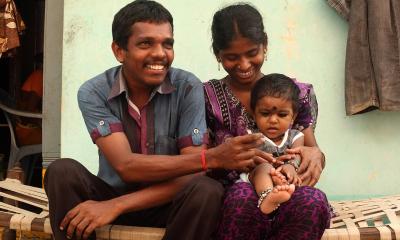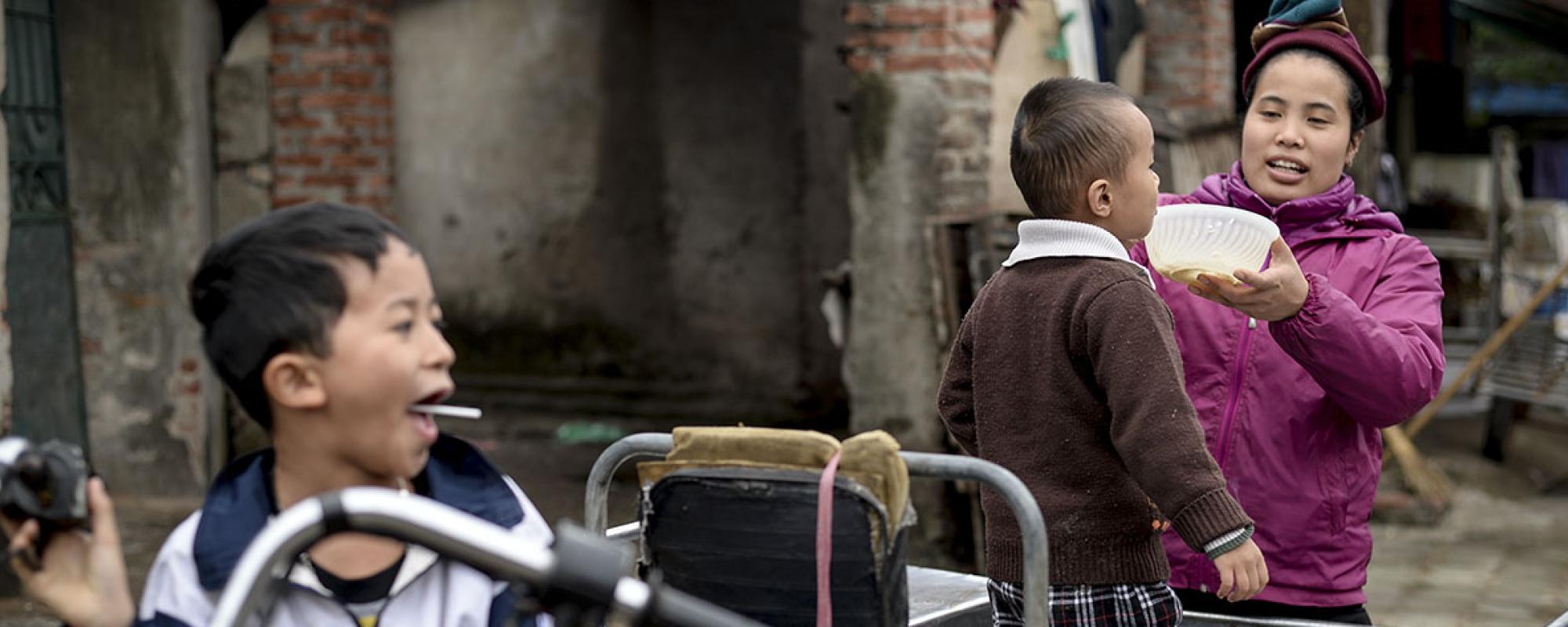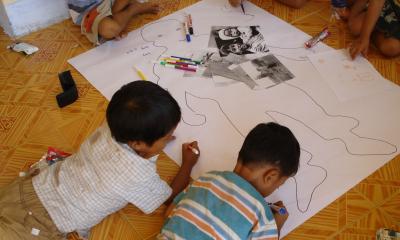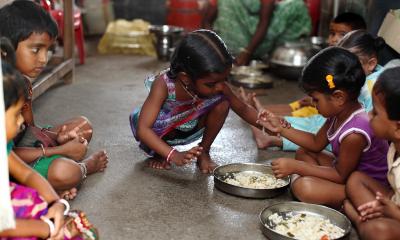
Understanding how both young women and young men experience and respond to different aspects of their family lives is central to achieving many of the targets on gender equality under Sustainable Development Goal 5, including in relation to unpaid care and domestic work, early marriage and parenthood and domestic violence.
Young Lives unique longitudinal data allows us to investigate how the consequences of childhood poverty and gender inequality play out in family lives and livelihood decisions. In their third decade of life, many of the young people in our study have already entered into marriage or cohabitation, setting up households and having children of their own. Our mixed-methods intergenerational research allows an in-depth understanding of what happens within households, and how widening inequalities impact young people’s transition through adolescence into adulthood.
- Gender differences in young people’s transition to adulthood widen significantly during adolescence, affecting young women and young men in different ways at different times, particularly in relation to education, early marriage and parenthood, migration and getting a decent job.
- Gender differences in young people’s paid and unpaid work become more marked from the age of 12 onwards, especially within the poorest households, with girls directed towards unpaid domestic and caring roles, and boys more likely to undertake paid work, farming and other enterprises.
- Strong gendered norms continue to influence the idea of the husband as provider and the wife as caregiver and give the husband control over major decisions in the household.
- COVID-19 exacerbated gender differences in unpaid domestic work, as families tended to resort to traditional gender roles in times of stress. Young women bore the greatest burden of increased household duties and looked after children who were unable to go to school.
- Increased responsibilities of unpaid domestic and care work reduces the time that young women have to study and increases their risk of dropping out of school or university. Increased caring responsibilities are also having a direct impact on the likelihood of young women returning to work and increasing the gender employment gap. Lack of affordable and appropriate childcare is a barrier to women’s paid work.
- There has been a significant fall in levels of early marriage and parenthood over the last two decades; most young people and their parents now believe it is acceptable to marry later and delay childbirth for economic and health reasons.
- Despite overall positive trends, many girls still get married in their teenage years, particularly girls from the poorest households, in rural areas and whose mothers are less educated. Being out of school in adolescence is strongly associated with early marriage. In some contexts, young married couples often face significant social pressure to conceive within a year or two of marrying.
- There is a substantial gender bias in the age of both marriage and childbirth; young women at age 20 are up to fifty times more likely to be married or co-habitating, or to have at least one child, than young men.
- The transition to marital life is often particularly difficult for adolescent girls and young women, with few services designed to meet their sexual and reproductive needs; boys and young men are also marginalised from sexual and reproductive health services. Multiple barriers hinder young people’s access to modern contraception.
- Many young people experienced increased physical domestic violence during lockdown periods. This increase was identified among both young women and young men. Those who had previously reported experiencing physical domestic violence before the pandemic may have been particularly at risk during the lockdown.
Understanding how both young women and young men experience and respond to different aspects of their family lives is central to achieving many of the targets on gender equality under Sustainable Development Goal 5, including in relation to unpaid care and domestic work, early marriage and parenthood and domestic violence.
Young Lives unique longitudinal data allows us to investigate how the consequences of childhood poverty and gender inequality play out in family lives and livelihood decisions. In their third decade of life, many of the young people in our study have already entered into marriage or cohabitation, setting up households and having children of their own. Our mixed-methods intergenerational research allows an in-depth understanding of what happens within households, and how widening inequalities impact young people’s transition through adolescence into adulthood.
- Gender differences in young people’s transition to adulthood widen significantly during adolescence, affecting young women and young men in different ways at different times, particularly in relation to education, early marriage and parenthood, migration and getting a decent job.
- Gender differences in young people’s paid and unpaid work become more marked from the age of 12 onwards, especially within the poorest households, with girls directed towards unpaid domestic and caring roles, and boys more likely to undertake paid work, farming and other enterprises.
- Strong gendered norms continue to influence the idea of the husband as provider and the wife as caregiver and give the husband control over major decisions in the household.
- COVID-19 exacerbated gender differences in unpaid domestic work, as families tended to resort to traditional gender roles in times of stress. Young women bore the greatest burden of increased household duties and looked after children who were unable to go to school.
- Increased responsibilities of unpaid domestic and care work reduces the time that young women have to study and increases their risk of dropping out of school or university. Increased caring responsibilities are also having a direct impact on the likelihood of young women returning to work and increasing the gender employment gap. Lack of affordable and appropriate childcare is a barrier to women’s paid work.
- There has been a significant fall in levels of early marriage and parenthood over the last two decades; most young people and their parents now believe it is acceptable to marry later and delay childbirth for economic and health reasons.
- Despite overall positive trends, many girls still get married in their teenage years, particularly girls from the poorest households, in rural areas and whose mothers are less educated. Being out of school in adolescence is strongly associated with early marriage. In some contexts, young married couples often face significant social pressure to conceive within a year or two of marrying.
- There is a substantial gender bias in the age of both marriage and childbirth; young women at age 20 are up to fifty times more likely to be married or co-habitating, or to have at least one child, than young men.
- The transition to marital life is often particularly difficult for adolescent girls and young women, with few services designed to meet their sexual and reproductive needs; boys and young men are also marginalised from sexual and reproductive health services. Multiple barriers hinder young people’s access to modern contraception.
- Many young people experienced increased physical domestic violence during lockdown periods. This increase was identified among both young women and young men. Those who had previously reported experiencing physical domestic violence before the pandemic may have been particularly at risk during the lockdown.




